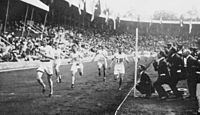Athletics at the 1912 Summer Olympics – Men's 1500 metres
| Men's 1500 metres at the Games of the V Olympiad
|
|||||||||||||
|---|---|---|---|---|---|---|---|---|---|---|---|---|---|

The finish with Arnold Jackson setting a new Olympic record.
|
|||||||||||||
| Venue | |||||||||||||
| Dates | July 9 (semifinals) July 10 (final) |
||||||||||||
| Competitors | 45 from 14 nations | ||||||||||||
| Medalists | |||||||||||||
|
|||||||||||||
|
|
Arnold Jackson |
|
|
|---|---|---|---|
|
|
Abel Kiviat |
|
|
|
|
Norman Taber |
|
The men's 1500 metres was a track and field athletics event held as part of the athletics at the 1912 Summer Olympics programme. It was the fifth appearance of the event, which is one of 12 athletics events to have been held at every Summer Olympics. The competition was held on Tuesday, July 9, 1912 and on Wednesday, July 10, 1912.
Forty-five runners from 14 nations competed, including the Olympic champion from 1908, Mel Sheppard.
Arnold Jackson won the final by 0.1 second, ahead of an American trio, who were strong favourites, in what was acclaimed at the time as "the greatest race ever run". Aged 21, he remains the youngest ever winner of this event. This was the last Olympics where "private entries" were allowed (i.e. not part of a country's officially selected team), and Jackson was one such.
These were the standing world and Olympic records (in minutes) prior to the 1912 Summer Olympics.
(**) This track was 536.45 metres= 1⁄3 mile in circumference.
Abel Kiviat finished his semifinal only 1 second off the Olympic record time of 4:03.4; he and all six other finalists whose times are known broke that mark in the final. Kiviat took second behind Arnold Jackson, who set the new record at 3:56.8.
All semi-finals were held on Tuesday, July 9, 1912.
Semifinal 1
Semifinal 2
Semifinal 3
Semifinal 4
Semifinal 5
Semifinal 6
Semifinal 7
The final was held on Wednesday, July 10, 1912.
...
Wikipedia
